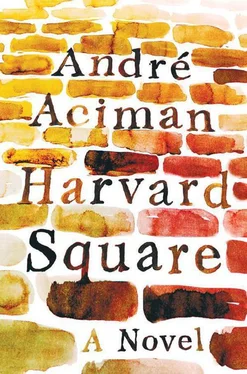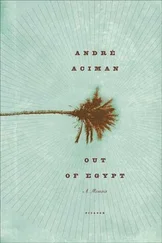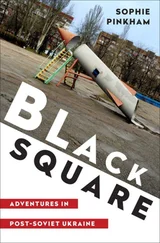I whispered the message to Kalaj. He immediately put an index finger to his lips, meaning say nothing . It was the equivalent of a fermata in music, the strategic prolongation of a sound, except that the sound here was silence, the deliberate silence of someone who has just plopped down a penny on the table and is waiting for you to do the same before raising you with yet another. This was the very essence of lingering. Once you’ve asked your question do not say a thing more; when you’ve put your one chip on the table don’t add a second simply because the other person is hesitating or because the silence between the two of you has become unbearable.
“How long will it take you to get here?” the lawyer asked.
Once again I whispered in French: how long did he think it would take?
“Ten minutes.”
I was baffled. It usually took almost three times as much to get there from Cambridge.
“Quick,” said the lawyer.
Standing up, Kalaj gulped down the remainder of his coffee, left some change on the table, picked up his things, and off we went. We hopped into his car and right away, after a few awkward turns through narrow alleys to the river, his huge Checker cab — the tank, the Titanic, the armored vehicle and intrepid war machine — was zipping its way at breakneck speed on Memorial Drive with the wonky grace of an aging dowager on wheels.
In my life I had never traveled so fast. We were begging for an accident. Why had I ever befriended such a nut?
“Where did you learn to drive?” I said, my way of asking him to slow down.
“In a driving school owned by a Tunisian Jew in Marseilles. That’s why we make the best pilots in the Israeli air force, didn’t you know?” he jested.
It was the lawyer himself who opened the doors to his firm on the twenty-sixth floor. “This way, gentlemen.” The collar of his striped white and blue shirt was unbuttoned and his sleeves rolled up above his elbows. This, Kalaj signaled, was not someone getting ready to head home.
We entered an office overlooking the harbor. Boston looked magical from such a height. Both of us must have gasped, the way hired waiters do when they’re first shown the way from the kitchen to the main dining room in a posh mansion.
We had rehearsed our spiel in the car. What Kalaj wanted was not just for me to translate, but to read between the lines, to extract, to interpret, to intercept, from what the lawyer was saying the core of what he wasn’t saying. In this as in everything else, he wanted complicité. The lawyer put both feet on his desk, took out a fresh yellow legal pad, removed the cap of his pen with his teeth, and placed the lined pad on his thigh, meaning: OK. I’m listening .
“Kalaj’s wife is suing for divorce,” I explained.
Nod, nod, meaning: And this is surprising? He lit a giant meerschaum pipe.
“They haven’t been living together for over two months. He’s living in a tiny rented room in Cambridge. The question is: Will this hurt his chances for getting a green card?”
Nod, nod from the lawyer, meaning: Did you honestly believe that it wouldn’t?
“If both agree to go for an interview before divorce procedures are set in motion, might this help things?”
Nod, nod. It might .
“Is there anything that can be done to hasten the process before the issue of his divorce comes up?”
“We can try to ask them to hold an interview sooner — but it’s not good to push the people at Immigration. They get very suspicious. And let me warn you, they do deport people they suspect of operating in bad faith.” Silence. “Why is she suing for divorce?” he asked, as though more out of personal curiosity.
“Pourquoi veut-elle divorcer?” He understood the question, but I had to go through the motions of asking him. He whispered a few words in French.
“She alleges he cheats on her.”
Nod, nod. No shit .
“Well, gentlemen, all I can promise is to request that they move up the date of the interview.”
Kalaj did not ask me to translate.
“His father is sick in Tunisia. He needs to leave the country for ten days.”
“Not advisable.”
“ Il se fout de notre gueule, ou quoi? Is he fucking with us or what?” whispered Kalaj. Then, to the lawyer he said, “Well, thank you. And by the way,” he added, turning to a series of framed photo portraits on the wall, “they’re all wrong.”
The lawyer cast a disbelieving look at his framed photographs of heavyweight champions. “Not Carnera, Baer, Braddock, Schmeling, Louis, Charles, Marciano,” said Kalaj. “It was”—and he proceeded to list them by heart the way every French schoolboy knows his La Fontaine’s Fables —“Willard, Dempsey, Tunney, Schmeling, Sharkey, Carnera, Baer, Braddock, Louis, Charles, Walcott, Marciano, Patterson, Johansson, Liston, Ali.”
“Wow. I’ll have to look into it. Does he know Köchel numbers too?” asked the lawyer with irony in his voice as he turned to me.
“No, he’s not a Mozart fan, but if you ask him, he’ll explain exactly why asparagine emits that unmistakable smell each time you eat asparagus and go for a piss.”
I didn’t have the heart to tell Kalaj that the lawyer’s cold, disaffected replies spoke volumes and couldn’t possibly bode well. But Kalaj didn’t need me to tell him that. “I paid him three thousand dollars and all he does is smoke his huge Sherlock Holmes pipe and nod.” He made his usual imitation of Yankee nasal sounds as they’re mimicked the world over. Not advisable. Not advisable. Not advisable.
Kalaj knew of a lovely small Italian place in the North End where we could stop for dinner. He liked to show he could speak some Italian, which he had picked up in Milan. We had veal stewed in thick buttery wine sauce. I had not eaten so well in months. We usually split the bill right down the middle. This time Kalaj insisted on paying. I refused to accept. “I make five times in one day what you make in a whole month,” he said.
He was right.
He ordered a second bottle of wine. On the small television placed above what looked like a makeshift bar, the news bulletin showed Egyptian President Sadat landing in Israel, with the Israeli army band playing the Egyptian national anthem. I recognized the anthem from my old school days in Egypt. I liked the anthem now. What a glorious moment.
Did he believe there was going to be peace now?
He lifted his left wrist, looked at his watch, and said “Yes.” For the next five minutes.
“The Arab and Jew go to dinner. It should be the title of a movie.”
“When every Jew and every Arab will have killed each other, there’ll still be one Arab and one Jew left and they’ll continue drinking cinquante-quatres . I just hope there are more like us,” he said. “Do you think there are?” Then, not waiting for an answer, he added, “Some friendship. The Arab and the Jew.”
I said I didn’t know. He said he didn’t know either. We laughed. In Cambridge, there weren’t.
The waiter and the cook were muttering something in dialect. We were, Kalaj said, no longer in Boston but in Syracuse. Not too far from Pantelleria.
“Did you like Syracuse?” I asked.
“I hated it.”
“So did I.”
We started to laugh.
“Let’s have a cinquante-quatre Chez Nous .”
On the way back to Cambridge he told me that he’d loved Maupassant. Stendhal was good, yes, but Balzac was a genius. “But this fellow Sade disgusts me. Please take it back and let’s forget you ever lent me such a book.”
I had never believed that a man with so much life experience could be easily shocked. But he was genuinely upset. He was, his lifestyle aside, an unmitigated prude.
Читать дальше












